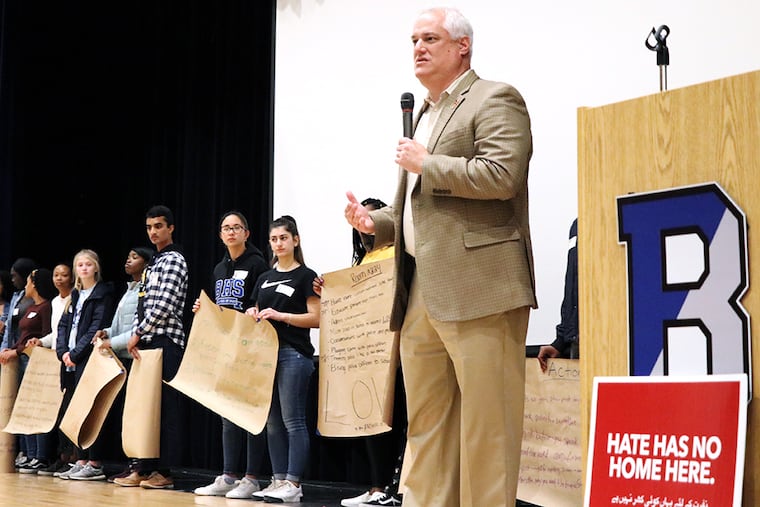‘At first, it made me feel defensive’: How Bucks County’s DA is confronting racism with local police | Opinion
Matthew D. Weintraub: We're creating a dialogue between civilians and police officers to make our communities safer.

Conversations about race and policing in Bucks County, which sharpened after the murder of George Floyd in May, gained more momentum after other high-profile deaths nationwide. These are challenging conversations, but we must prioritize them to find common understanding between our communities and the police officers who serve them. Here in Bucks County, we have been bringing people together on this issue since January in ways that have already had a positive impact.
Last year, I was approached by the Peace Center of Bucks County to consider purchasing the rights to A.J. Ali’s documentary film program, Walking While Black: L.O.V.E. is the Answer. Much more than just a film, the program’s purpose is to create a movement by engaging our communities and the police together.
» READ MORE: Trump held his own in Bucks County in 2016. But it might be slipping away in 2020.
I’ll admit, I was skeptical. I watched the movie. At first, it made me feel defensive. It is difficult for me to accept that the racism it documents is widespread among our police departments, especially those I’ve worked with so closely. But upon reflection, I realized that my perception and experience that racism is not prevalent among our police are not shared by everyone, especially people of color and the younger “YouTube generation,” which has seen recording after recording of police violence.
If this film could get our community members and police officers talking together about racism, then maybe that conversation could help break down broader stereotypes and defuse growing tensions. Persuaded that we needed this film, I purchased the universal licensing rights, allowing me to show it in Bucks County anytime, anywhere, and to anybody.
Our first showing was during the MLK Day of Reflection at Bensalem High School last January. Over 400 people participated, including over 30 police officers, and students and community members from school districts across Bucks and Montgomery Counties. We hosted two other live programs in central and upper Bucks County before the pandemic, facilitated by the Peace Center. Attendees watched the film and then broke into smaller discussion groups, each of which included facilitators, community members, and the police who serve them.
Having participated in these discussion groups myself, I am convinced they are the first step toward breaking down barriers and obliterating prior defenses and perceptions. Participants go from feeling raw to relating to each other as individuals rather than stereotypes. I’ve seen it happen.
Right from the beginning, the film depicts graphic violent encounters between police and Black people. It then moves into interviews of Black law enforcement officers and civilians who’ve experienced racially biased treatment themselves from the police. From these various perspectives, the viewer is made aware of the need for greater training and sensitivity among law enforcement to racism and racial inequity.
The film also highlights specific experiences of white officers and Black people who originally viewed their interaction through the lens of stereotypes and bias but were able to move beyond those initial reactions to find genuine human connection — and even, in one instance, redemption and forgiveness. In so doing, the movie doesn’t just highlight the problem but offers hope for solutions.
» READ MORE: A Bucks County program is turning local cops into ‘ambassadors’ and connecting drug users with treatment
The facilitated dialogues following our screenings can be electric, sometimes painful, but always cathartic. Police officers, and the civilians who viewed them with suspicion and even hostility before, end up eating pizza together and discussing the film constructively. Such direct communication creates familiarity, understanding, and common ground. Police officers become aware of the presumptions that underlie their interactions with people of color and the way such presumptions erode confidence and trust. In turn, ordinary people begin to understand the difficulties and dangers police face every single day as they perform the work of keeping us safe from harm.
During the pandemic, we’ve hosted the program virtually numerous times and at maximum capacity. Fortunately, the online format has only added to the momentum we’ve gained on the important work this project has helped us achieve: standing in each other’s shoes even for a little bit and finding our shared humanity. As a result, civilians and police officers alike leave these live and virtual discussion groups with a better appreciation for what it means to be a person of color or a police officer today.
» READ MORE: Cop’s fatal shooting of Doylestown man was justified, Bucks County DA says
My office remains committed to perpetuating this essential dialogue on race and policing. We’ve organized a day-long racial equity training for our staff facilitated by the Peace Center. The dialogue sparked that day continues with mandatory follow-up racial literacy trainings. In addition, the Bucks County Commissioners have followed our lead and mandated that all 2,400 county employees view A.J.’s film and participate in follow-up discussions. I am heartened that we continue to get requests from throughout the county for more viewings of the film. Almost every police chief in our county has required their officers to watch this important movie. Although I was the first DA in the country to purchase the rights to A.J. Ali’s film, other DAs have since done so as well.
We all have hard work to do. One film is not a panacea. But I’m proud that Bucks County is willing to embrace this catalyst for change and work toward a more just, unified community.
Matthew D. Weintraub is a career prosecutor and district attorney of Bucks County.